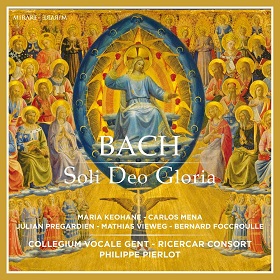Under the direction of Belgian viola da gamba player Philippe Pierlot, the Ricercar Consort continue their exploration of J.S. Bach’s sacred cantatas – an intermittent project over the last twenty odd years that now brings on board the voices of Collegium Vocale Ghent. Ever since Nikolaus Harnoncourt and Gustav Leonhardt began their survey of these works in the 1970s, with subsequent traversals by John Eliot Gardiner issued since the millennium, Bach’s multi-movement works have secured a notable discography. Perhaps these much-celebrated recordings from Telefunken and SDG (and not forgetting outings by Herreweghe, Koopman and Kuijken) have tended to overshadow the work of Pierlot whose Bach cantata recordings with Mirare, while not terra incognita, deserve a wider audience.
This new issue consolidates Pierlot’s cantata journey with two unusually extensive works that, while lavishly scored, date from two distinct periods of the composer’s career: Ich hatte viel Bekümmernis BWV 21 (1714), belongs to the years of experimentation at Weimar and Die Himmel erzählen die Ehre Gottes BWV 76 (1723) was written soon after Bach had settled in Leipzig. Both works are in two parts (each part separated here by an organ prelude from the Orgelbüchlein) reminding us that for certain Sundays the composer provided additional music as a substitute for a congregational chorale. The cantatas display considerable expressive and stylistic variety, not least the sheer vitality of vocal writing and wealth of instrumental colour with uplifting trumpets closing the darkness to light trajectory of BWV 21 and launching the powerful certainties of BWV 76.

While the Ricercar Consort is clearly established on the continent in performances of German Baroque cantatas and has been recording with Mirare for two decades, this French label ((established in 1995) only came into my orbit in 2015 when musicologist Simon Heighes, via BBC Radio 3’s Record Review, selected the Ricercar Consort’s one-to-a-part performance of Bach’s Magnificat as his top choice. With each account (both recorded in the Église St-Jean à Beaufays, Belgium) Pierlot draws fresh, jewel-like transparency from his forces, their bright tone colours amply projected by Mirare. Only in this recent performance does Pierlot trade solo voices doubling as the chorus for a ready-made vocal group, one distinguished by superb blend and ensemble and heard to impressive effect in the collection of choruses within these two works.
The clarity of both singers and instrumentalists brings dividends to the heartening convictions of BWV 76 and to the more intimate, even angst-ridden spirit of BWV 21. But the two works inhabit entirely different characters, something here that might have been given more definition. While comparisons can be invidious Pierlot sets a forthright tempo for the opening Sinfonia (to BWV 21), in contrast to the restraint of Herreweghe (Harmonia Mundi) or the tenderness of Koopman (Challenge Classics). There’s no doubting the quality of the Ricercare Consort but soft edges are missing from the direction which at times feels almost didactic and informs much of this digital only recording.
On the plus side, Pierlot has assembled a strong team of soloists with tenor Julian Prégardienmaking the most of his dramatic contributions, especially convincing in the histrionic outbursts of ‘Bäche von gesalznen Zähren’ and the exultant aria ‘Erfreue dich, Seele’ (with its marvellously athletic cello writing) of BWV 21. Similarly, he is suitably authoritative in the powerful entreaties of ‘Hasse nur, hasse mich recht’ from BWV 76. Belonging to the same cantata bass soloist Matthias Vieweg is no less emphatic in his single aria ‘Fahr hin, abgöttische Zunft!’, a rich tone, if with a trifle too much vibrato, nicely complemented by a splendid trumpet obligato. Vieweg forms a fine partnership with Swedish soprano Maria Keohane in the charming duet of BWV 21, yet I longed for a more yielding quality, and sensed I was being sung at, rather than sung to. Earlier, Keohane beguiles with scrupulously etched phrases in ‘Seufzer, Tränen, Kummer’, butdespite exquisite oboe playingany senseof the text’s emotional agony is largely absent. She fares better in the buoyant ‘Hört, ihr Völker, Gottes Stimme’ (BWV 76), where a light-footed solo violin weaves elegant phrases to further evoke God’s grace. Lastly, the Spanish counter-tenor Carlos Mena – a regular soloist with Pierlot – cuts a dash in the lilting rhythms of ‘Liebt, ihr Christen, in der Tat’ (also BWV 76), its message of brotherly love stylishly achieved.
Four organ preludes come as a bonus, played with much affection by Bernard Foccroulle on the splendidly characterful instrument of Strasbourg’s Église réformé du Bouclier. Its quirky, eyebrow raising tuning takes nothing away from the much-loved ‘Ich ruf zu dir Herr Jesu Christ’ BWV 639 and enhances the garish colours of ‘Allein Gott in der Höh sei Ehr’ BWV 715.
In summary, this new release is a worthy addition to the Bach cantata catalogue with soloists, chorus and instrumentalists vividly caught in clean, polished performances.
David Truslove
Maria Keohane (soprano), Carlos Mena (alto), Julian Prégardien(tenor), Matthias Vieweg (bass), Bernard Foccroulle (organ), Collegium Vocale Gent, Ricercar Consort & Philippe Pierlot.
J.S. Bach: Cantata BWV21, Ich hatte viel Bekümmernis; Cantata BWV76, Die Himmel erzählen die Ehre Gottes; Chorale Preludes from Orgelbüchlein’ – ‘Ich ruf’ zu dir’ BWV639, ‘Allein Gott in der höh sei Her’ BWV663, ‘Herr Gott, nun schleuß den Himmel auf’ BWV 617, ‘Allein Gott in der Höh sei Her’ BWV 715
MIRARE MIR490D [83:30]